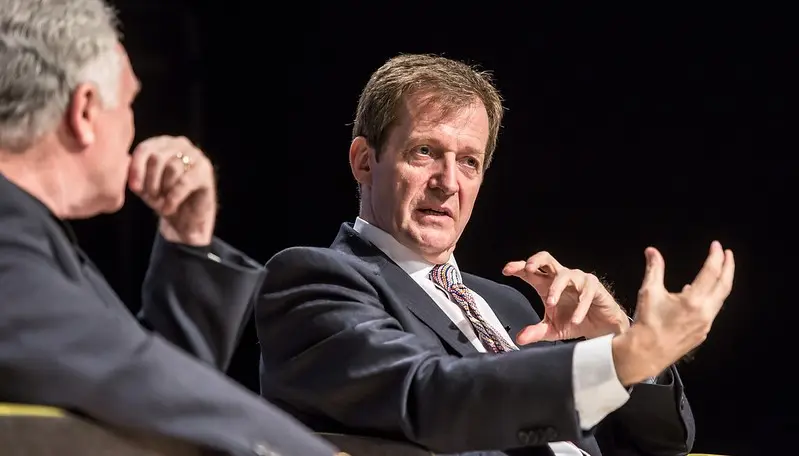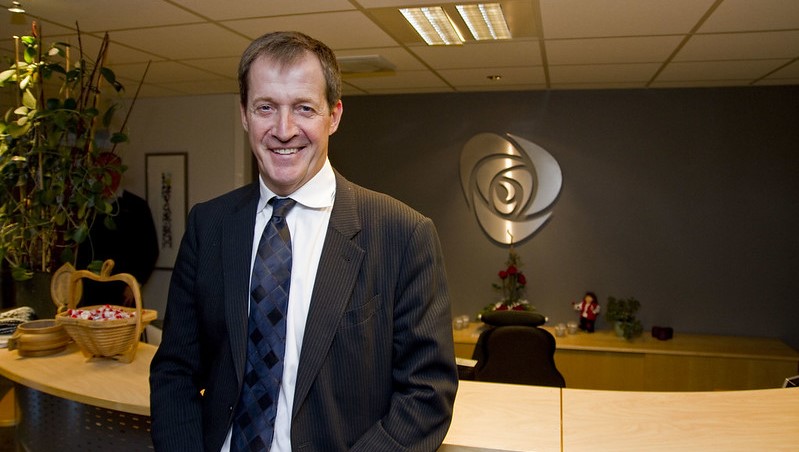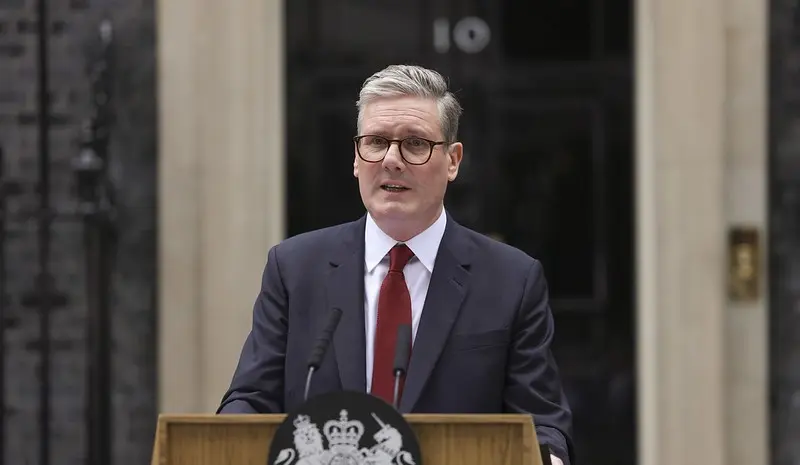
Contains discussion of mental illness, suicide.
Alastair Campbell is showing no signs of slowing down. If anything, despite the fact he’s just recently become old enough to have his winter fuel allowance cut, he seems to be speeding up. But it’s nothing new. Campbell has always been a workaholic – often to his own detriment.
In his first career as a journalist, he was a rising star on Fleet Street – political editor of The Daily Mirror and Today, before hopping over the fence in 1994 to accept a job offer from Tony Blair. He would later become the government’s press secretary and head of strategy – titles that do no justice to the influence he wielded in the New Labour project.
Since leaving front line politics, he’s swapped spinning stories for spinning plates – becoming the bestselling author of nineteen books, a mental health campaigner, strategy advisor, speaker, broadcaster, anti-Brexit warrior and of course, a podcaster. He’s found success in all of these areas (apart from maybe Brexit – we still appear to be out), but it’s his podcast with ex Tory Minister Rory Stewart, where he’s struck gold.
The Rest is Politics is one of, if not the biggest podcasts in the country, a regular chart-topper that has spawned numerous sell-out live tours. Campbell and Stewart will be playing the O2 arena next Tuesday – quite the achievement for two ‘centrist dads’ chatting about current affairs.
It’s been one hell of a journey – sometimes plagued with controversy, often plagued with mental health struggles. In our conversation, we covered much of it. But we began at the beginning.

The son of two Scots, Campbell was born in Keighley, West Yorkshire, schooled in Bradford and Leicester, and later secured a place to read modern languages at Cambridge. He says that university was something of a culture shock – “I didn’t enjoy it much…I found the whole place very odd, lots of the people a bit weird.”
He didn’t write for the student paper – “is that a terrible thing to say?” – but it was during university that Campbell had his first work published. Bizarrely, this was a collection of softcore pornography he penned for Forum magazine under the pseudonym ‘Riviera Gigolo’. But E.L. James had little to fear – the foray into erotica was brief, and after graduating he was offered a place on the Mirror Group’s South West training scheme.
He learned his trade on local papers across Devon and Cornwall, the kind of outlets where “if you got somebody’s name wrong, they didn’t write to you, they came in”, and after stints in Plymouth and Tavistock, he moved to the Truro Sunday Independent, where he met Fiona, his partner of 45 years.
“What interested me about journalism was the idea of storytelling. It’s one of those amazing jobs where you can literally go up to anyone in the street and talk to them…I’ve always had this view that there’s a story in everybody.”
“I’ve always had this view that there’s a story in everybody”
Campbell’s big break came with coverage of the 1981 Penlee Lifeboat Disaster, when stormy weather caused sixteen seamen to drown off the south coast of Cornwall. Within a year, he was headhunted to the nationals. But no matter where he ended up, it will always be local news where he started, and Campbell finds its decline in recent years a worrying phenomenon.
“They give something to the community, not just in terms of knowledge, but in terms of community cohesion. Without them, lots of stuff goes under the radar…put in this way, if one had to be diminished, I think it would be better for the country that it were national newspapers rather than local.”
Indeed, despite his years on Fleet Street, Campbell is often scathing of the national media. On the podcast, he regularly laments bias in the right wing press – and told me of his exasperation at industry nepotism.
“There are far too many people, you see them on the national papers all the time…their dad or their mum knows someone who works on Paper X, and they’re straight out of university and they’re writing a bloody column on something and you think, well, where did your training come from?”
His advice for aspiring journalists who don’t have that luxury? “Be curious, be interested, and write – don’t worry if you get stuff rejected. Just give it a go.”

All through his journalistic career, and through much of what’s come after, Campbell has struggled with mental illness. This, combined with his brother Donald’s schizophrenia, inspired him to become a campaigner on the issue – and for years now he has been pushing for changes in perceptions and increased funding for services.
“I had a psychotic breakdown in 1986, and was advised to stop drinking, which I did. What I later realised is that, though I thought I was solving everything by stopping drinking, there was something else going on that probably led me to start drinking in the first place. It took me a long, long time to confront what that might be. Eventually, much later in life I acknowledged to myself that it was depression.”
“Somebody said to me when my diaries were first published, ‘god you weren’t happy were you?’ I said “what do you mean?” and he showed me the diaries – woke up depressed, went to bed depressed, too much to do, couldn’t face it – there was a lot of that stuff going on. But because I was very energetic and absolutely committed to the job – I powered my way through most of the time, but that takes a toll.”
In terms of national progress on the issue, Alastair says “we’ve definitely gone backwards. To be fair to Cameron and Clegg and the coalition, they did support the Time to Change campaign about changing attitudes to mental health, and that was genuinely helpful. But looking back I wonder if they weren’t doing it partly as an excuse not to have to focus too much on services.”
“We’ve gone forward on attitudes and stigma, we’ve gone backwards in services…in many parts of the country they are a complete mess. I don’t think we’ve fully caught on to why there is this seeming epidemic of anxiety, why suicide is such a big killer of young men. We don’t fully understand why it’s happening – we hang on to fairly glib possible answers – it’s social media, it’s lockdown – maybe, but we don’t know.”
“We’ve gone forwards on attitudes and stigma, we’ve gone backwards in services.”
We also explored the relationship between journalism and mental health – the effect on individuals when they find themselves in the midst of a media storm.
“I got to know Princess Diana quite well. And the very first time I met her, she said, ‘why did you used to write those awful things about me in your column?’ and I said ‘what, you read that stuff?’ and she said ‘yes, I read everything’. It forced me to confront the idea that I probably didn’t think of her as a human being at all, because her fame was such and her profile was such that she was just somebody you wrote about.”
“Quite a lot of the people who wrote about me didn’t ever really think about whether it had an effect – by the way I’m not saying they should, doing the job I was doing. But sometimes you do have to step back and realise you’re dealing with human beings here.”
In his younger days, Campbell’s mental illness was compounded by alcohol abuse. On drinking, he thinks a total cultural reset is required – in society as a whole but especially among students – “I mean the whole Freshers Week thing, Jesus.” To students who might be slipping into alcoholism, he says “just try to resist it. Recognise when it’s becoming a bit compulsive, too regular. It’s very hard though, because it creeps up on you.”

Today marks 100 days of Keir Starmer’s Labour government. If you can call the first half of that a honeymoon, you certainly can’t apply that label to the second half. In recent weeks, headlines have been awash with the winter fuel cuts to pensioners, freebies accepted by members of the Cabinet, and fervent speculation about internal divisions and the recently departed Sue Gray. All of these factors, combined with government policy on Gaza, have sent the Prime Minister’s popularity ratings tumbling.
As someone who was central to the previous Labour administration, there are few better placed than Campbell to assess how the new government has handled it’s first few months. I asked him to give them a score out of 10 so far, both on policy and on comms. He pauses. Chuckles. “7 for policy, 6 for comms.” I tell him I think he’s being generous on the latter.
He relents a little – “At the live shows, Rory Stewart has the ‘tribal button’, a big red buzzer between us that he presses if he thinks I’m being too tribal so maybe I would have got the buzzer for that answer. But look, I think they made a good start – very quickly I think people thought, yeah, he looks like the Prime Minister, sounds like the Prime Minister…I thought the King’s speech was good and the riots were handled well.”
“But then the combination of the fuel cut dropping out of a clear blue sky, allied to this stuff about free tickets. And by the way, I know people get fed up when Labour people do this, but it’s nothing compared to the corruption with a capital C that went on under the last lot. But Keir, having rightly said he was going to restore standards in public life – that involves making sure that the public feel that those standards are being restored.”
“It’s nothing compared to the corruption with a capital C that went on under the last lot.”
“And lets be honest, if you wanted to find an issue that would tear at the heart of the Labour Party, and make it very difficult to hold the thing together, it’s Gaza. So all those things have combined to give them a shaky few weeks.”
On Sue Gray – “they focused a lot on me in the way that they’re focusing on her. I think they try and do it to undermine the people at the top. They said I was calling the shots, not Tony Blair, it’s almost like it’s anti-democratic. I also think there was lots of misogyny involved, and I think there were people inside the Civil Service trying to do her in. There were also probably Labour people who didn’t think she was fully Labour because she’d been a civil servant most of her life and worked for Tory governments and so forth.”
“Ultimately, all that stuff gets way too much attention. It’s up to the politicians at the top to set the agenda, set the direction, to be in charge of strategy. Where you may think I’m being a bit generous on the comms – what strategic comms involves is the devising, the execution and the narration of your strategy all the time, in a never ending conversation with the public about who you are, what you’re doing and why you’re doing it. And that’s just not really been there.”
We finished on the issue of political apathy, a problem particularly prevalent among young people. While the stats for this year’s election are yet to be released, in 2019 less than half of 18-24 year olds turned out to vote – a figure that is not likely to have improved. With young people so disengaged, is it inevitable that their issues get sidelined?
“If you think back to the last election – what was the first thing that Rishi Sunak came out and started making big promises on? The triple lock on pensions. Did issues, specifically about young people, get any real look in? Not sure. If politicians thought that every young person was going to vote, it would completely change the nature of political debate.”
“If politicians thought that every young person was going to vote, it would completely change the nature of political debate.”
So how do we solve this issue?
“It’s hard, especially in a time of populism and polarisation, when people are very cynical. The best way to solve it is to show that democratic politics can deliver the things that people want for their lives.”
“I would definitely lower the voting age, I would also have proper political education in schools. Unless you do Politics A Level, you don’t learn anything about politics at school. So where are you learning about politics – your own life, your parents, TikTok. One of the reasons the far right are doing well in Europe is because they’re just better at that social media stuff than the more established mainstream parties. And the third thing I would do – I would have compulsory voting.”
Presumably, he means compulsory voting for Labour.
If you’re struggling with your mental health, there is support available on campus, or at the NHS (call 111) or at the Samaritans (call 116123)


